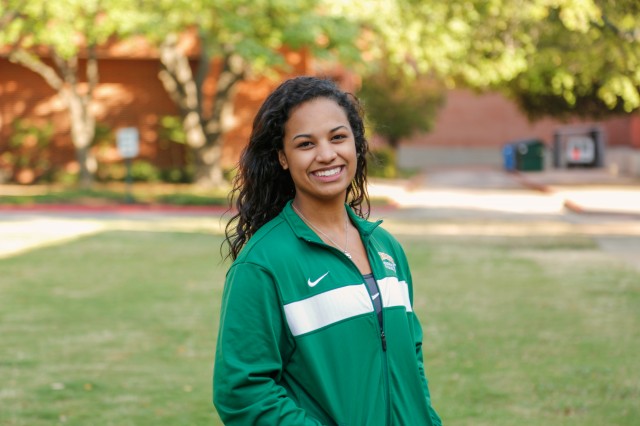
By Tori Jackson
Reporter
Cameras, lights, makeup and bows describe the life of a competitive cheerleader, but that does not justify the talent and skill set needed to execute a two minute and 30 second routine.
Although the NCAA does not recognize competitive cheerleading as a sport, girls around the world are fighting the battle to get their passion recognized.
Quinnipiac University, located in Hartford, Conn., announced in 2009 that they would eliminate their women’s volleyball team for budgetary reasons and replace it with the competitive cheer squad to satisfy Title IX needs.
Title IX is the federal law that prohibits discrimination on the basis of sex in schools that receive federal funding — including in their athletic programs.
On July 21, 2010, the Second Circuit U.S. Court of Appeals ruled that competitive cheerleading was not a sport and that colleges and universities could not use this activity to satisfy the gender-equity requirements of Title IX.
Volleyball coach Robin Sparks and five members of Quinnipiac’s volleyball team filed a lawsuit against the university on its decision to eliminate the program.
After finding out the school was over-reporting participation opportunities, District Judge Stefan Underhill issued a temporary injunction that allowed the volleyball team to remain part of QU’s athletic program.
Although the school thought that competitive cheer would keep it in compliance with the Title IX rule, Underhill disagreed and announced his verdict after a week-long trial.
“Competitive cheer may, some time in the future, qualify as a sport under Title IX,” Underhill said. “Today, however, the activity is still too underdeveloped and disorganized to be treated as offering genuine varsity athletic participation opportunities for students.”
The NCAA should recognize competitive cheerleading as a Title IX sport because of the athleticism, strength and agility that is showcased throughout a performance.
The word sport is defined as “an activity involving physical exertion and skill in which an individual or team competes against another or others for entertainment.”
At a competitive cheerleading competition, teams are competing against more than one team in front of a panel of judges. The judges will score the routines based on difficulty, cleanliness and execution of skills.
At the end of each division, the judges will tally the scores and announce the winner at an awards ceremony. Competitive cheerleading is similar to gymnastics in the aspect of performing in front of a panel of judges.
Two of the main things that separate competitive cheerleading from gymnastics is that gymnastics is actually a Title IX sport and the fact that gymnasts compete individually. Competitive cheerleaders typically compete with a group of 15 to 36 others.
During one performance, competitive cheerleaders will flip and twist their bodies through the air, catch girls that are airborne and stack bodies on top of each other to build a two-story pyramid.
Of course, some may say that competitive cheerleading is not a sport because it does not involve a ball or that it is subjective because routines are judged, and they are right.
Results of sporting events should not be determined based on someone’s personal feelings or opinions, but rather on talent, skill and the ability to score enough points to beat the other team.
With that being said, if they were using this excuse to keep competitive cheerleading from being a sport, gymnastics should fall in the same category.
It is not right to take away from the participants because they do not use a ball or because they are scored by judges.
That is one of the biggest downfalls of competitive cheerleading, but if you take away those two aspects, people will notice how much practice, time and effort it took to prepare for the performance, just like any other sport.
The NCAA has overlooked the athleticism of the people that participate in competitive cheer and should consider the participants in this “activity” athletes because of the physical strength and skill executed in each performance.
The NCAA should reconsider its decision and deem competitive cheerleading a sport.
Tori Jackson is a senior journalism major from Missouri City. She is a reporter for The Lariat.



